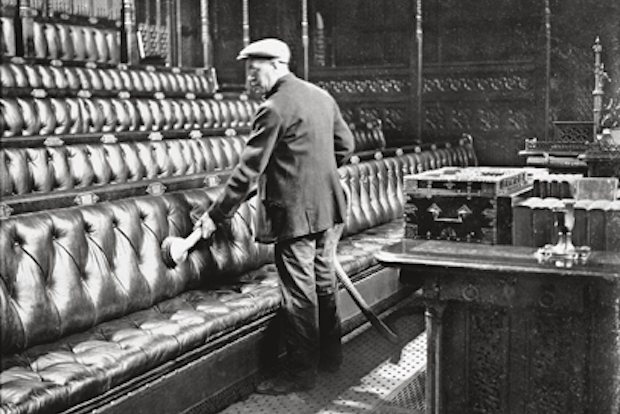From ‘Parliament and Registration‘, The Spectator, 10 July 1915:
The modern rigidity of the party system has enabled Ministers, once they have attained to power, to despise the House of Commons, for they know that the Whips will see that the party votes straight, and that is all they care about. This is a fundamental mistake, for the House of Commons in war time quite as much as in peace time is, with all its defects, one of the most valuable of our institutions. It provides the machinery for the criticism of the Government under conditions in which that criticism can most effectively be made and most effectively be answered. Newspaper criticism, useful as it is from many points of view, suffers from two defects—first, that it is often made by persons who are not directly in touch with the management of affairs and who certainly have no definite responsibility for that management; and secondly, that it is directed to a large and undefined body of people to most of whom the actual working of public affairs is more or less of a mystery. On the other hand, all members of the House of Commons get to know something about the way in which public affairs are actually managed; many of them get to know a good deal, and all of them can be made responsible for what they say and do by an appeal to the constituencies. Therefore a debate in the House of Commons, if properly conducted, is of necessity a more effective means for checking Government blunders than a newspaper debate can possibly be. But the essence of good debate is that it should be taken seriously by both sides, which means that the members of the Cabinet should take the trouble to defend themselves. The chances are that the creation of the Coalition Cabinet will force this necessity upon the members of the Government, and that, instead of destroying the House of Commons, as might have been feared, the reconstruction of our Government system on non-party lines will lead to the rehabilitation of Parliament as a debating assembly. Nor need the country be, impatient because that assembly, by the necessity of its being, provides a platform for cranks as well as for the exponents of common-sense. It is well that the cranks should have their say, not merely because there is always a chance that they may occasionally be right, but even more because the expression of their extreme opinions, if it is followed by reasoned debate, enables the country to obtain a balanced view of the whole situation.






Comments